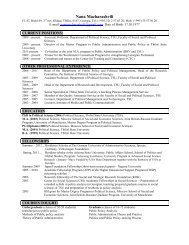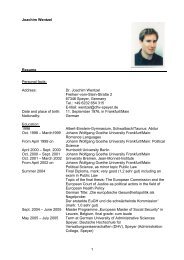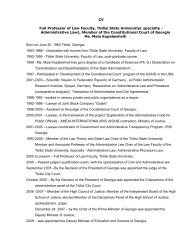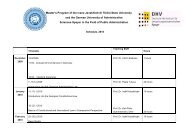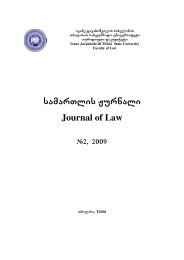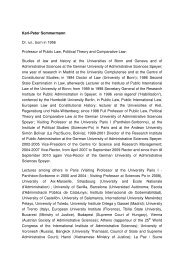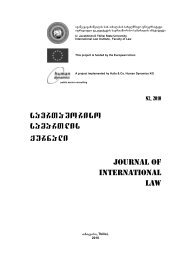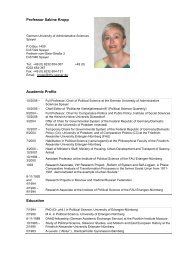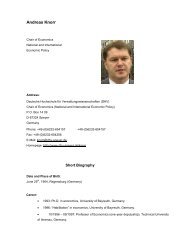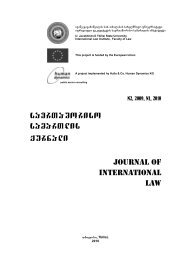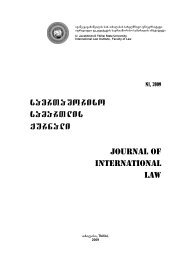Untitled
Untitled
Untitled
You also want an ePaper? Increase the reach of your titles
YUMPU automatically turns print PDFs into web optimized ePapers that Google loves.
saerTaSoriso samarTlis Jurnali, #1, 2008 JOURNAL OF INTERNATIONAL LAW, N1, 2008<br />
opposable before the courts of a foreign State,<br />
even where those courts exercise an extended<br />
criminal jurisdiction on the basis of various<br />
international conventions on the prevention<br />
and punishment of certain serious crimes.” 79<br />
The Court “conclude[d] that immunity does not<br />
mean impunity.” Unfortunately, however, this is<br />
exactly what it means. The four grounds enumerated<br />
by the International Court of Justice 80<br />
almost never work. As Yang argues, “in seeking<br />
to exercise universal jurisdiction over a<br />
foreign State or a foreign national who may<br />
benefit from State immunity, a domestic court<br />
has to satisfy two conditions: first, that the<br />
court has universal jurisdiction, as conferred<br />
by international law; and second, that the foreign<br />
State or the individual does not enjoy<br />
immunity under the circumstances.” 81 This is<br />
exactly the problem. The law and state practice<br />
must develop in a manner to overcome<br />
the principle according to which the high ranking<br />
officials of other states use immunities as<br />
a shield to avoid prosecution for international<br />
crimes, when the four circumstances enumerated<br />
by the ICJ do not work in practice and<br />
they stay at large, not bearing responsibility<br />
for most terrible atrocities.<br />
As it was underlined already, the Versailles<br />
Treaty recognized a possibility of trying a state<br />
leader implicated in perpetration of egregious<br />
crimes. Pinochet case, even though, very limited<br />
in its conclusions, must be considered as<br />
a guideline and a precedent creating case in<br />
the efforts against impunity of the highest level<br />
state officials. However, the concept of holding<br />
the criminal leaders accountable for international<br />
crimes anywhere, so that they are not<br />
able to enjoy impunity in any part of the world,<br />
disrespecting nexus of a crime perpetrated by<br />
them to the state prosecuting them, must turn<br />
to be a rule of customary international law and<br />
states may not be able to claim their sovereign<br />
immunity when putting to justice their criminal<br />
leaders. The Versailles Treaty and Nuremberg<br />
prosecutions laid a good ground for making<br />
this reality. Now, as the sufficient time has<br />
passed and the human rights law has developed<br />
well enough to protect human beings<br />
from the massive atrocities perpetrated by<br />
their or other states’ criminal leaders, quest<br />
for justice may not be shadowed by already<br />
archaic conception of absolute protection of<br />
sovereign immunities. Before making humanitarian<br />
intervention a finally settled rule of international<br />
law, it would be much more appropriate<br />
and practical to recognize universal jurisdiction<br />
over international crimes, perpetrated<br />
by high level state officials, when serving<br />
their term of office and give them as less possibilities<br />
to shield behind armours of protection<br />
of immunities as possible.<br />
VI. CONCLUSION: SHALL IMMUNITIES<br />
CONTINUE TO STAND ON THE WAY TO<br />
THE PROTECTION OF HUMAN RI\GHTS<br />
The essay has demonstrated that protection<br />
of sovereign equality of states and inviolability<br />
of sovereign immunities has been subjected<br />
to considerable restrictions throughout<br />
the 20 th century. Development of human rights<br />
law has prompted and necessitated considerable<br />
changes in the field. As the law progresses,<br />
the development of protection mechanisms<br />
from atrocities must evolve further, and states<br />
must recognize the importance of prosecution<br />
of the criminal leaders for the atrocities they<br />
perpetrate misusing their official capacity and<br />
influence, as well as a state apparatus for that.<br />
If the right of humanitarian intervention<br />
may be recognized as an appropriate mechanism<br />
to employ, when the human rights atrocities<br />
reach unimaginable scales, international<br />
law must allow breach of sovereign immunity<br />
and individual criminal responsibility under the<br />
universal jurisdiction of acting heads of states,<br />
as well as other high level state officials, protected<br />
by immunity. Law must develop in a way<br />
to allow individual criminal responsibility for at<br />
least international crimes to fall under universal<br />
jurisdiction and not to let criminal leaders<br />
to escape justice and seek safe heaven when<br />
the relatively minor perpetrators receive punishment.<br />
It may be enquired, if may there be any<br />
international organization able to pronounce<br />
on lifting the immunity ratione personae from<br />
alleged perpetrators The Security Council of<br />
the United Nations could be such an organ.<br />
“The United Nations Security Council is mandated,<br />
under Chapter VII of the United Nations<br />
Charter, to deal with threats to, or breaches<br />
of, international peace and security. Often<br />
such threats or breaches may and indeed do<br />
result from, among other things, serious<br />
crimes.” 82 The Nuremberg Tribunal recognized<br />
the individual criminal responsibility for the<br />
atrocities of all sorts of political leaders. The<br />
74



